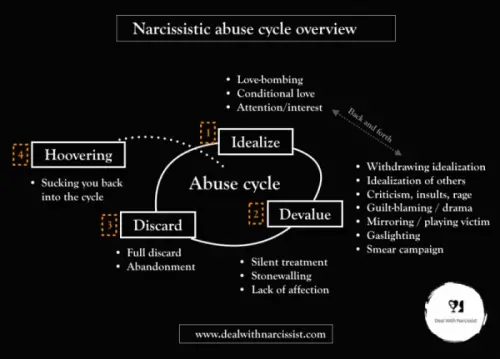In this article, I will go into the cycle of narcissistic abuse. Sadly, a lot of people experience or have experienced this cycle of abuse. It’s mainly used to describe the unhealthy dynamics in a romantic relationship with a narcissist but it could also give some insights into familial relationships such as the relationship with a narcissistic parent.
The narcissistic abuse cycle describes the stages of abusive behaviour of narcissists when in a relationship with them. The pattern of emotionally abusive relationships consists of stages of idealization, devaluing, and discarding. It’s a repetitive cycle where additionally a narcissist could try to hoover you back into the relationship after breaking the cycle.
The relationship cycle of narcissistic abuse shows the extent of possible brutal and manipulative behaviour of narcissists. This behaviour leads to very unhealthy dynamics and the only real solution to protect your energy is to break the cycle and go into a no-contact situation. The cycle could also be stopped by the narcissist if you, for example, don’t fulfill their narcissistic needs anymore. Sadly, in most situations, a relationship can go endlessly through the cycle until you recognize it and you manage to stop the cycle.
It can, however, be a struggle and very challenging to definitively break the cycle and even more to not be sucked back into it. There are some helpful ways to emotionally detach from the narcissist, such as temporarily using the grey rock method, before going no contact. It could help you to eventually break the cycle if you feel you can’t do it right away. It requires emotional detachment and a lot of strength and courage to break the cycle.
When dealing with narcissists it’s necessary to learn about the cycle of narcissistic abuse and the corresponding behaviour. Knowledge is needed to recognize what’s going on or what happened to you so you can eventually shift attention to yourself again to heal and recover. I hope this article will be helpful to you. I will first go into the cycle in short and how narcissists choose their victims, then dive into the stages and finally discuss how to possibly deal with it.
The narcissistic abuse cycle in short
Before going into the stages of the narcissistic abuse cycle it’s necessary to explain the cycle as a whole. The cycle is used by several psychologists and websites about narcissism and is an adjusted cycle based on the traditional cycle of abuse of Lenore Walker (1979).
The traditional cycle needed to be adjusted because the difference between non-narcissistic abusers and narcissistic abusers is that narcissists never apologize and will not admit any fault. They are fully self-centered, feel superior, and are capable of playing the victim while being the abuser.
I summarized the cycle and added the narcissistic behaviour corresponding with the stages in the following overview:

The stages of narcissistic abuse in short
The narcissistic abuse cycle thus shows three or arguably four stages. In short, these stages are:
- Idealize: The stage of idealization is the ‘perfect’ stage where the narcissist performs love-bombing and shows (conditional) love, attention, and interest.
- Devalue: The stage of devaluing is a stage of withdrawal of earlier idealization and showing increasingly more manipulative and abusive behaviour such as guilt-blaming, mirroring, and gaslighting.
- Discard: The stage of discarding consists of full discard/abandonment.
- Hoovering: At this point, the narcissist tries to suck you back into the cycle. It can be seen as a part of the cycle depending on how strong the discard stage was used. It could also be seen as a method to get you back into the cycle of abuse.
The dynamic of the cycle can play out in varying pace and kinds of manipulative behaviour. There can be a lot of going back and forth between different stages. Idealization and devaluation could be experienced almost simultaneously and it might feel like playing ping pong with great highs and deep lows. The devalue stage can become increasingly abusive starting with slowly withdrawing idealization into full smear campaigning and silent treatments.
I think the silent treatment, stonewalling and lack of affection lie somewhere between the stage of devaluing and discard. The earlier behaviours during the devalue stage are communicative and silent treatment is a form of distance and pulling communication away as well. I’ll go deeper into this when discussing the stages.
In general, the narcissistic abuse cycle thus can go on continuously with a lot of going back and forth between stages. A narcissist will customize their behaviour to who you are or what behaviour they are capable of. How it specifically plays out depends on their intelligence, intent/awareness of their own manipulation, their communication skills and unending needs combined with the person you are and your strengths, vulnerabilities, and beliefs.
The victim choice of a narcissist
Some narcissists will specifically search for victims while others will find victims more unconsciously. In general, a narcissist needs narcissistic supply and is trying to fill a form of emptiness. Their ego has taken over control and they crave appreciation, validation, and ego-boosting. They could even mistake their identity created by ego for an authentic soul.
Narcissists often go for those with status, attractiveness, success, and wealth. They love those that are popular and are loved by others. It’s attractive to them. It’s about appearance and superficial success. The greater you appear, the higher value you could have to them. They want to win you over and then control/devalue you. It makes them feel empowered, boosts their ego, and proves their superiority to themselves.
The stages of the cycle of narcissistic abuse explained
Below, I will go deeper into the stages of the cycle of narcissistic abuse and the corresponding narcissistic behaviour.
1. Idealization stage
The first stage of the narcissistic abuse cycle is idealization. The narcissist will shower the target with loving attention, care, compliments, and tries to win you over. They will paint a perfect picture and show a great amount of loving behaviour. You are the special one, their soulmate, or the love of their life. They could mirror your likes, dislikes, and agree with you on everything. The narcissist will be learning all about you such as your strengths, weaknesses, and insecurities.
Some narcissists could think they are in love and it could be real to them. It’s because you give a lot as you’re probably a loving and empathic person. They idealize you and you could seem perfect in fulfilling their needs. Their needs involve things such as status, sex, money, control, validation, appreciation, and ego-boosting. The problem is that their love is conditional which means it will end when their needs are greater than your supply.
To be clear, it’s impossible to fulfill their unending needs. You would need to become less like yourself, cross your boundaries, and agree the narcissist is superior and more worthy than everyone else. You might allow being less like yourself a bit but there is always a turning point or wake-up call in your mind or soul. At some point, you won’t be able to fulfill the narcissist’s unending needs and this is where the idealization stage will (slowly) end.
Narcissistic behaviour within the idealization stage
These kinds of behavior by narcissists are typical for the idealization stage:
- Love-bombing: Loving and romantic behaviour. A narcissist learns your love language and exactly what you want to hear. They will adjust and customize their loving and romantic behaviour specifically to you. It could involve being praised, getting gifts, going on vacations/trips, having intense sex, and talk about the future.
- Conditional love: The narcissist will give conditional love as long as you fulfill their needs. If you want to read more about how a narcissist ‘loves’, you can read my article exploring what is love to a narcissist and whether they can fall in love.
- Attention/interest: A narcissist can be very charming, intelligent, and chivalrous. They are highly developed manipulators and know how to be the ‘perfect’ partner. They can make you feel great about yourself for a while and give you all their attention.
In the idealization stage the narcissist becomes the center of your world
All narcissistic behaviour in this phase is thus very cruel because it’s all an act and not sincere. Know you can’t blame yourself for not seeing or recognizing what’s going on in this phase. This phase, full of love-bombing and attention, can be like pure ecstasy for both victim and narcissist.
You could become addicted to the overwhelming love and feel like you’re the center of their world. In reality, the narcissist becomes the center of your world and you try to become their perfect partner. No one can be ‘perfect’ so you will start to see the hidden truth of the narcissist when you move into the next stage of devaluation.
Within the period of idealizing there could still be red flags or moments of seeing through their behaviour. They could test some boundaries early on with for example provocative comments disguised as jokes. Sometimes their mask slips off by accident and we see their true empty self. Your intuition might feel something but mostly it’s not strong or clear enough to start doubting them. It’s more likely you ignore it or doubt yourself.
2. Devaluing stage
The stage of devaluing follows after the idealization stage. This stage can start in a stealthy and (very slow) manipulative way. You might not even realize this is going on. When this has started, your intuition will probably send you more and more messages. You could feel something has changed but you can’t really tell what. This is where you might start to questions yourself and get some doubts.
The pace devaluation happens can differ and can be very slow or sudden. A narcissist could go back and forth between idealization and devaluing. Mostly the narcissist withdraws without explanation. They start showing the behaviour of the idealization stage to others, such as praising, flattery, attention, or flirting. It seems they lost interest in you and you might think it’s because of you.
At this point, you will get criticism, insults, rage, and a lot of frustration thrown at you. Everything they do shows they can be nice but you become the negative exception and appear to not be worthy of their love. The narcissist will increasingly disappear, use excuses, and discrepancies in their behaviour will happen more and more. Meanwhile, they try to make you the crazy jealous person that needs too much attention.
When their idealization act stops it’s like their mask falls off completely. You will see the person underneath and it’s not pretty. It becomes clear the narcissist doesn’t care about you or your feelings. There will be a lot of drama and verbal/emotional abuse. They turn things around on you all the time and mirror what’s happening. A narcissist could try to gaslight you so you appear as the crazy one. There will be guilt-blaming, shaming, lying, and all kinds of manipulative behaviour. Their aim is that you start to doubt yourself and basically become under their control. You could become anxious, doubtful, less confident, feel drained, and in general feel less like yourself.
A narcissist plays a manipulative game and is all about appearance. They could thus play a public game and a private game which might be even more confusing and painful. People in their environment will probably be very positive and think you’re lucky to have a relationship with this person. These people don’t see what’s going on in your home and all the manipulative and abusive games they’re playing. The people under the control of a narcissist are called flying monkeys and you could read my article about the narcissist’s web of control if you want to learn more about how they work to create this web of control.
The discrepancy between your positive view of this person being a loving person and their manipulative behaviour can cause a feeling of discomfort and anxiety. This is called cognitive dissonance. Their actions aren’t consistent (idealization vs. devaluation) with how you see them and your mind will search for ways to reduce this discomfort. It can create an unhealthy state of being anxious and confused. I wrote an in-depth article explaining cognitive dissonance and how to deal with this. I recommend reading it as it’s a very important subject when it comes to recognizing what’s going on and turning the effects around.
Narcissistic behaviour within the devaluation stage
I wrote several articles about these unhealthy relationship dynamics and the effects all these kinds of manipulative behaviour could have on you. I wrote an in-depth article about the empath narcissist relationship in which I go into unhealthy relationship dynamics such as the narcissist taking and the empath giving, a relationship that revolves entirely about the needs of the narcissist, fading boundaries, the empath feeling responsibility for the behaviour of the narcissist, and more. It’s a very toxic relationship abusing the other person’s vulnerabilities, helpfulness, and empathy.
An intelligent narcissist will exploit both your strengths and your weaknesses. All of their attention and all questions asked were there to gain knowledge useful to manipulate and control you. It means they could (ab)use, for example, your sympathy, empathy, fear of abandonment, and forgiveness.
Gaslighting
A narcissist could use gaslighting to try to slowly disconnect you from yourself. It’s one of the finest forms of manipulation of some narcissists and very disturbing. Gaslighting is ongoing manipulation and brainwashing to cause the victim to have increasing self-doubts and eventually lose their own sense of perception, identity, and self-worth. In essence, they try to make you crazy and make you doubt your feelings and memory. I wrote an in-depth article about gaslighting if you want to find out more about this specific behaviour and how to deal with it.
Silent treatment and stonewalling
A narcissist can use silent treatment and stonewalling as a brutal manipulation method. It’s a passive-aggressive tactic and can be very frustrating. It’s about gaining a sense of control by avoidance, silence, and/or disempowerment. The silent treatment is a very disrespectful and unhealthy way of ‘communication’. There are different forms of silent treatment such as stonewalling, lack of affection, and ‘everyday’ silent treatment. You can read more about these kinds of behaviour in this article about the silent treatment or learn more in my video about this.
In my opinion, the silent treatment and stonewalling lie somewhere on the line between devaluing and the discard as these are methods of withdrawing communication and creating distance. The earlier manipulation techniques use communication instead of using distance. The silent treatment could thus also be used as a form of discard and there might not be a full discard in all relationships. Some narcissists could use silent treatment and distance to search or be around new narcissistic supply. They might go into idealization or back into devaluing after that.
3. Discard stage
The ‘discard’ stage is the last stage and can come out of nowhere and everything may seem fine right before. You might get a call, text, or message dismissing you in a cold and painful manner. It’s a full discard and they could say you’re crazy or psycho. They could use a smear campaign where they try to hurt you and blame you for everything. They could also ghost you and abandon you without any communication. It’s very cruel and brutal behaviour in any way.
You suddenly are worth nothing to them. Sadly, this was true to them from the start because they don’t have empathy and you were only an object to fulfill their needs. When you don’t fullfill their unending needs anymore they see no value in you. It’s transactional to them. To you, sadly, it can be a big surprise and therefore it can be very painful because you didn’t see it coming.
A narcissist thus drains your energy and then possibly abandons you. It’s painful and humiliating. There won’t be any answers, closure, apology, or a normal conversation. Discard can have serious consequences such as depression, anxiety, trauma symptoms, and even suicide.
It’s because ff someone doesn’t know what they were dealing with they could blame themselves for being abused. Therefore, I want to spread knowledge and hopefully help others this way. Going through and surviving the discard means there still is a long road of healing and recovering ahead. I strongly recommend seeking a therapist to help in your process of healing.
4. Hoovering
Your road of healing and recovery can sadly be disturbed by hoovering. The discards often are only temporary. The narcissist could try to suck you back into a relationship and the cycle would start over. Hoovering is thus trying to trick or bait you into breaking no contact and re-engaging with the narcissist. It’s essential to break the cycle and thus know how to deal with hoovering.
A narcissist abuses your strengths, vulnerabilities, and beliefs about love and life. I believe it’s important to learn about hoovering and therefore I wrote an article specifically about hoovering and how to possibly deal with it. You can read more about the triggers narcissists (ab)use in this article as well.
Breaking the cycle
There is no doubt the only real solution is to eventually manage to break the cycle. This is not easy and you might need time to first emotionally detach from the narcissist. You could use the grey rock method to do this when going no contact with the narcissist is not an option (right away).
Grey rock is a temporary method in which you become emotionally non-responsive and as unappealing and boring as a grey rock. You can read more about how to do it in this article about the grey rock method. This method helps with emotionally detaching from the narcissist and it also reduces the narcissistic supply they get from you.
I also wrote an article about what to expect when breaking up with a narcissist. It could be useful when you decide to break up and want to learn about possible reactions by the narcissist.
Another method for gaining self-control and gathering your thoughts is using conscious breathing or mindfulness. Conscious breathing focuses on the mental aspect of dealing with narcissists and can be used when still interacting with a narcissist but more importantly after going no contact as well. It helps with shifting mental attention to yourself again, acknowledging your feelings and restoring your energy. If you want to learn more about this you could read my article about conscious breathing, or my article exploring mindfulness and narcissistic abuse.
I hope this article and other articles can provide some insights and help in dealing with narcissistic abuse. Knowledge is necessary when dealing with narcissists. I wish you strength and more kindness in the future!

Did you like this article and is it helpful to you? I encourage you to share, like, follow, comment, and possibly subscribe to my newsletter to receive monthly updates of my activities!


This article could have been written about my last relationship. It describes it to a “T”!! My husband had passed away and I was vulnerable. I remembered a guy from my past and when he accepted my friend request, I came home. He messaged me when I got to my hometown and we met at the city park. It all started from that meeting. I mentioned the life insurance I’d be getting in the next couple of days. He was perfect!! I’ve never had so much in common with someone. The sex?? Omg!!! There was a couple red flags I ignored. He hadn’t seen his daughter in over a year and they lived in the same town. I also had a trip to Germany planned and while I was there he spent 36 hours texting his sister in law. Over 200 texts to her while 9 to me! The devaluing stage was so subtle! I wasn’t sure he’d really meant the little jabs or was I misinterpreting them? That part went on for 2 years. I got a text message at work informing me he had. I feelings for me and he’d tried but sorry. I tell people how weird it was that the night before he had emotion in his eyes but that day it was gone! He knew of my buttons that would get me suicidal. He not only pushed them he tap danced on them! He and his little flying monkey who gets off on the abuse. He would ghost me for days then be sweet and fakely apologetic. He spent hours making his rounds to every female friend he had to hurt me more. I found out he’d been going over to the 25 year old office girls house every day while I was working. He was trying to hook up with her but he was twice her age. He’d also started the smear campaign a year before. I had no clue. He told people we were broken up and I was so obsessed with him I refused to leave! He told people that and I lost a lot of friends then he gave me an eviction notice allegedly from his mom our landlord. It was written by him and his flying monkey! He did do something uncharacteristically of him. He showed his cruel treatment of me to his friends and supporters. They have now distances themselves from him and helped me. He decided at the last minute to not allow me to get my stuff from the house. He had gone through everything I’d packed and took what he wanted. He also had agreed to allow me to store it in a spare room for 2 months and conveniently forgot ever saying I could. I have the text messages that prove it. He has moved on to a new relationship. He met her on a dating site and they are madly in love. I am working on me and am not interested in dating right now. I have been journaling like crazy and have found the strength to see him for the toxic person he is. He seemed to get angry that I wasn’t pining over him anymore. When I saw him, I literally felt nothing! He is nothing to me. I don’t find him attractive at all anymore!! He’s ugly and makes me cringe when I think about how much I loved him and craved his affection. I said I feel nothing for him? That’s a lie. I feel regret. It’s my biggest mistake I’ve ever made!!
Thank you for your articles. I can’t believe how accurate they are. He left me broke, essentially homeless, and yet stronger than I ever would have imagined! He failed miserably in his quest to destroy me! Had he not created the space away from him by ghosting me, I’d still be stalking him and trying to fix it.
Thank you for sharing your story Kelly and I’m thankful if my articles can provide some help in your process. I’m sorry you had to experience this. It’s very brutal and disturbing how this kind of manipulation works. I understand you feel regret but know you can’t blame yourself for being manipulated this way. He abused your vulnerability and worked in very subtle ways.
I’m glad you had the strength and courage to recognize the truth and the toxic situation and you managed to break free. The pain and your experience allow you to become stronger now and it’s inspiring you turned this around into working on yourself. Great you have been journaling and that you’re working on healing. It’s a good thing your friends recognized the situation as well as you can use their support in recovering.
Keep working on you! You are worth your own loving attention. I wish you strength and more kindness in the future. Take care!